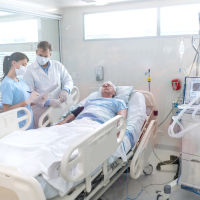Patients admitted to the ICU have a high mortality rate. Even those who survive the stay tend to suffer from long-term morbidity and reduced quality of life. Critically ill patients frequently present with low blood pressure, oliguria, and skin mottling. These are the signs that usually guide treatment. Most critical care guidelines on the management of shock recommend that patients should be treated based on clinical examination, which should be supplemented with critical care ultrasonography.
However, data on the prognostic value of clinical examination findings are inconsistent. Different predictors of mortality have previously been identified, which include low blood pressure, oliguria, prolonged capillary refill time, and skin mottling. But in most cases, these signs are evaluated in isolation and are not assessed as a combination of signs and symptoms, which could potentially improve diagnosis. Overall, the prognostic value of clinical examination still needs to be established in a large trial of critically ill patients. This is exactly what the Simple Intensive Care Studies-I (SICS-I) aimed to do - to evaluate which clinical examination findings are independently associated with 90-day mortality in acutely admitted ICU patients. The researchers also hypothesised that combined clinical examination findings would have similar prognostic value compared with existing prognostic scores.
A total of 1075 adult patients with an unplanned admission to the ICU and who were expected to stay for at least 24 hours were included in the study. One-third of these patients were admitted after acute or complicated surgery. The most common diagnoses were of cardiovascular or respiratory origin. The primary outcome of the study was 90-day all-cause mortality.
Findings show that after 90 days, 28% of the patients had died. These patients were significantly older, more often mechanically ventilated and had higher positive end-expiratory pressures and lower diastolic blood pressures and mean arterial pressures. Also, patients who died had lower urine outputs, colder extremities, longer CRTs, and more severe skin mottling during their clinical examination.
Five clinical examination findings were found to be indecently associated with 90-day mortality. These included a higher respiratory rate, higher systolic blood pressure, lower central temperature, altered consciousness, and decreased urine output. Clinical signs reflecting cerebral, renal, and skin hypoperfusion were independently associated with mortality.
Overall, the predictive value of a basic clinical examination was similar to that of SAPS-II and APACHE-IV while outperforming the SOFA score.
Source: Critical Care Medicine
Image Credit: iStock
References:
Hiemstra B et al. (2019) Clinical Examination for the Prediction of Mortality in the Critically IllThe Simple Intensive Care Studies-I. Critical Care Medicine. doi: 10.1097/CCM.0000000000003897
Latest Articles
ICU, mortality, critically ill patients, clinical examination
A simple clinical examination, which can be performed in any critically ill patient in any setting, has reasonable discriminative value for assessing 90-day mortality.



























